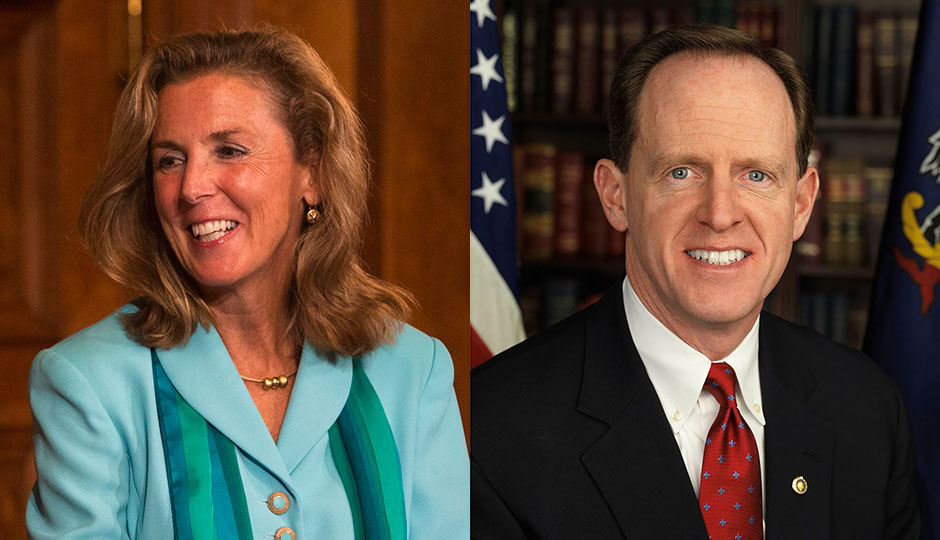McGinty and Toomey Debate Whose Lives Matter, Trump, and One Another’s Failings

Left: Katie McGinty photo by Donald Derosa, used under a Creative Commons license. Right: Pat Toomey, Official Portrait
The race between Republican U.S. Sen. Pat Toomey and Democratic challenger Katie McGinty long ago devolved into a punch-out, with untold millions being spent on television ads attacking both candidates. On Monday night, the candidates met in the ring for the final time in a debate hosted by 6ABC and the League of Women Voters and held at Temple University.
For the most part, the discussion covered much of the same ground as last week’s debate in Pittsburgh. The loudest round of cheers and boos came toward the end of the night, when the candidates were responding to a question from moderator Jim Gardner about racism in American police departments. The boos started when Toomey began describing what he called “the problem with the Black Lives Matter movement.”
“I’m absolutely convinced that the vast majority of policemen and policewoman across this Commonwealth and the country are not racists,” Toomey said. “They’re trying to do the very best they can to protect us. And the problem with the Black Lives Matter movement, and Katie McGinty propagating this, is just that that phrase itself is meant to impugn the integrity of the police by implying that they don’t think that black lives do matter. And in fact, it’s my view that all lives matter, and I think police get that.”
The phrase “all lives matter” seems anodyne enough in a vacuum, but supporters of the Black Lives Matter movement bristle at it. That’s probably because it so often sounds like a glib affirmation of the value of human life, used to shut down conversations about structural problems that primarily hurt black people. Toomey was both booed and cheered for his answer. Moments earlier, in response to the same question, McGinty had uttered the phrase “black lives matter.” But in context, it sounded quite a bit like an “all lives matter” sort of pivot.
“We’ve made a lot of progress in this country in terms of taking on racism and discrimination, but we by no means have succeeded in eradicating racism and discrimination from our society,” McGinty said. “Let me say, in my faith tradition, I am happy to say black lives matter, because from where I stand, when we recognize the dignity of any person, we’re all lifted up. And when any person is denied dignity, we’re taken down.”
She went on to describe her father’s years of service as a Philadelphia police officer and restated her support for investments in community policing.
ONCE AGAIN, Toomey refused to say who he’ll vote for in the presidential election. Gardner asked him directly, and Toomey gave another version of the answer he’s been giving regularly: Both candidates are bad, and he feels “stuck,” but he believes that Trump might sign some legislation and nominate some Supreme Court justices that he likes.
In his question, Gardner had noted that Toomey’s critics say he won’t disown Trump because he needs Trump supporters to win. Maybe so. But Toomey seems to think that refusing to endorse a candidate builds his credibility as an independent thinker. After the debate, I asked a campaign spokesman over email whether Toomey’s hoping to avoid losing voters by not endorsing, or whether he believes that he can actually gain some support by refusing to choose a “flawed candidate.” No answer.
“I don’t think my constituents care that much how one person is going to vote,” Toomey said during the debate.
Who knows? It almost seems fair to speculate at this point. Maybe he’ll vote for Trump despite his apparent misgivings. Maybe he’ll write in the ghost of Ronald Reagan. Maybe he’s secretly planning to pull the lever for Jill Stein.
A FEW WEEKS AGO, the McGinty campaign began focusing its attention on Toomey’s former ownership of a bank that had used a legal maneuver called a “confession of judgment” to foreclose on houses that were used as collateral for commercial loans. McGinty describes the practice as predatory, and notes that it’s illegal in 30 states. On Monday night, Toomey called McGinty a hypocrite for criticizing the practice, saying that the state Department of Environmental Protection had used it while McGinty was the Department’s secretary under Gov. Ed Rendell.
Talking to reporters after the debate, McGinty repeatedly declined to answer questions about whether the Department had used confessions of judgment. The Toomey campaign later circulated video of McGinty stonewalling reporters. I asked the campaign the same question over email a few minutes after McGinty left the scrum.
“The idea that Pat Toomey would compare his own bank’s history of foreclosing on Pennsylvanians to Katie’s tenure protecting the environment is a joke,” said Sean Coit, a spokesman for the McGinty campaign. “Here are the facts: Pat Toomey started a bank to make money for himself. At DEP, Katie worked for the public, for the environment, and for the commonwealth.”
In any event, McGinty’s decision to bring an obscure foreclosure practice into the center of the campaign hasn’t seemed to gain her much traction, as the race is still neck and neck. Could it end up hurting her?
Toomey seemed to think his counterattack was successful. After the debate, he declared himself the winner, and again refused to say whether he’ll vote for Donald Trump.
Follow @jaredbrey on Twitter.


